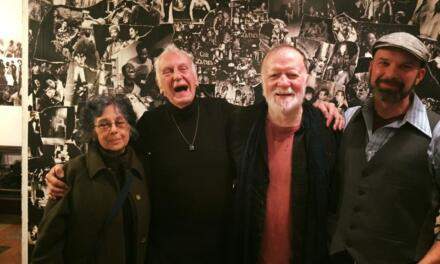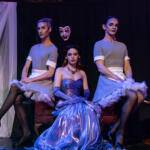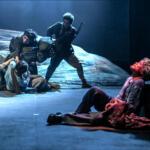Within the rich landscape of Romanian theatre festivals, TESZT has carved out a niche as an inclusive and regionally oriented forum, initially aimed at bringing together creatives from the geographical reach of Timişoara. Known as the informal capital of the historical Banat region and located at the westernmost point of Romania, Timișoara (Temeschwar in German, Temesvár in Hungarian, Темишвар/Temišvar in Serbian) is both literally and symbolically at the crossroads of several cultures, close to the neighboring capitals Budapest and Belgrade, as well as the multicultural cities of Arad (Romania), Novi Sad, Subotica (Serbia) and Szeged (Hungary). Despite this proximity, theatres in these cities have traditionally not entertained close connections, for obvious reasons during communism and for lack of opportunities in its immediate aftermath. TESZT was founded to rectify this, and has been championing multicultural and transnational awareness since 2008. During its 15 years of existence, this flagship initiative of the Csiky Gergely Hungarian State Theatre has been striving to act as a platform for cultural exchange by way of an invitation to dialogue – with an ever-expanding network of creatives and audiences in the area.
Central to this goal is the festival’s endeavor to present a wide range of dramaturgical possibilities and theatrical forms, with a view to broaden the notion of what performance is and can be in the 21th century. Thus, the festival regularly situates side by side solo acts, devised performances and staged versions of text-based plays, presented by emerging artists, independent platforms as well as established names and major theatre companies. In this way, TESZT actively contributes not only to diversifying performance aesthetics but also to energizing collaboration among cultural institutions of various scales, agendas and ambitions in the region, whilst prioritizing the participation of young creatives whose work is often excluded from other festivals and showcases. Unsurprisingly, this also triggers the presence of a younger audience, again not typical of all festivals, especially since ticket prices have soared, and there is a welcome synergy between students of acting, performance and dramaturgy. Seeing the latter review the productions put on by the former is a testimony to the festival’s declared commitment (as stated on their website) that TESZT is a place ‘where the young generation is treated as partner’.
In addition to presenting theatre performances – many of which are selected as a result of an open call, in parallel with the curators’ own choices – the festival also includes concerts and exhibitions, taking place in several locations in town, alongside the main theatre venue. The latter’s auditorium is in fact a shared space itself, routinely used by both the Hungarian and German company of the State Theatre of Timişoara, where a translation and/or subtitling service between different languages is provided on a regular basis. This has helped greatly with raising the profile of productions outside their specific ethnic communities, and also contributes to nurturing a transnational approach to contemporary art practice. In the context of the TESZT festival, switching between languages at various events, and what’s more, often within the same production, is standard, and it is equally delightful to note that audiences are able and prepared to react in a similar array of languages. English has long emerged as the mutual common denominator – and is now spoken by pretty much everyone under the age of fifty, but there is a concerted effort to celebrate regional languages, too. We savored the sound of Croatian and Bulgarian (that we do not speak) just as much as we enjoyed the languages we understand, such as Hungarian, Spanish and Romanian. Another highlight were the post-performance talks at the end of each day, the so-called ‘night talks’, when the audience-performer barrier was further dismantled and extended conversations ensued in the theatre bar and foyer.
This year’s anniversary edition, curated by Mona Donici with festival director Attila Balázs, brought together over a score of performance events from Bulgaria, Croatia, Finland, France, Greece, Hungary, Italy, Romania, Serbia, Slovenia, somewhat extending the original notion of regionality but nonetheless creating a space for innovative acts from outside the theatrical mainstream and advocating for creativity from the margins of Europe. A case in point amidst the rich geographical and linguistic diversity and varied theatrical forms was Livsmedlet Theater from Finland, with a nonverbal performance imbued with an intimate atmosphere: Invisible Lands. The two performers, who are also the directors and choreographers of the show, skillfully directed the audience’s focus to story fragments presented at a nearly microscopic level. Their bodies slowly transformed into landscapes, and with a few props and tiny figures, different scenes from the lives of refugees came to life in the small studio space before our very eyes. Thus, the show pertinently addressed a pressing issue without resorting to the clichés of some portrayals.
The spectators could witness people climbing spine-hills in the snowfall, a helicopter searching for lost individuals among knee-mountains, and people falling from a rubber boat and drowning in the belly-sea. The performers, Sandrina Lindgren and Ishmael Falke – a Swedish and Israeli choreographer and a puppeteer from Finland – intertwined their professional expertise with personal experiences on this subject. This fusion resulted in a delicate form of political theatre, which – rather than loudly proclaiming certain issues and shouting in our faces – silently questioned the media’s portrayal of the migrant crisis, drawing attention to the need for change on a large scale.
Another notable nonverbal production was Full Moon by internationally renowned choreographer Josef Nadj. A returning guest of the festival, this artist of Hungarian origin from Serbia, has embarked on multiple collaborations with a collective of culturally diverse dancers from Atelier 3+1 in France. This time, he even joined them on stage. Their newest show, which had its preview at the TESZT festival, continued the themes of their previous performance, OMMA: depicting the genesis of the universe through the movements of the body, the cardinal elements of our planet, and the primaeval power embodied by the dancers. As the title suggests, the production mirrored the rhythmic structure of the moon, echoing its 28-day cycle and four phases. Beyond the genesis of the universe, key themes and motifs included the journey through different cultures and races, witnessing the history of rhythm, hearing various natural sounds, and experiencing the birth of music. The performance also reflected on the eternal struggle between creator and creation, whilst being infused with recurring humor all along.
Humor played an important role in the Greek production Taverna Miresia, too, despite its main theme. Brought to TESZT by the Athens Epidaurus Festival, this show told a personal story by way of experiencing a major life event: the loss of the head of the family. The nonverbal performance took place in a large bathroom, the only place where we are always alone and shed the masks we often wear in front of others. In a bathroom, in front of the mirror, we are our true selves. Seeing the characters in this intimate setting and witnessing their vulnerability turned us into voyeurs, and we became witnesses to the different stages of grief they endured. We saw them getting naked before us, both literally and figuratively, as they fully immersed themselves in the mourning process and the rituals of purification. Within the confines of a short runtime, intensity was maximized and the tension became palpable. From the relatable starting point of the narrative, the emotional depths of grief and the complexities of relationships unfolded to a point where the weight could become all too heavy. Mindful of this conundrum, the creators negotiated the challenge by releasing tension from time to time with carefully dosed humor, and with visually striking images. Some of these frames are in fact likely to linger in our minds, especially the final scene: two girls covering each other’s naked bodies in mud from their father’s grave, the mother sitting naked in the shower on a chair, and her son gently braiding her hair. Such raw connections, unpretentious situations and gestures have the potential to draw us closer to the protagonists, deepening our understanding of their emotional experiences and reminding us of the inner simplicity at the core of our lives.
Death and humor forged an even stronger connection in the performance by Forte Company, another returning guest of the festival. This year, in co-production with Szkéné Theatre in Budapest, they brought an amorality play from Hungary, Anybody directed by Csaba Horváth based on the well-known Medieval morality play Everyman. Szilárd Borbély’s poetic adaptation began with the classic Hamletian question: ‘To be or not to be?’ – and after the opening scene, we were thrust into the mad world of contemporary suburbia, featuring allegorical figures representing the dominant types seen in such settings: the emblematic figures of consumerism, where even human life had lost its value. In every act, someone – or Anybody? – died, leaving the fundamental questions of human existence for the remaining characters to grapple with. Their corpse, their helpless (any)body, was constantly brought into play by their partners – the actors, who possessed exceptional talents for the art of movement. The outcome was simultaneously funny, spectacular, and thought-provoking, even if we found ourselves liberated by laughing directly in the face of Death.
As it has been the tradition in previous years, the host theatre company also presented some of their latest productions in the Festival. This year, it was the turn of 1978, a monumental show performed in an abandoned university building in the city’s suburbs. The show is part of a larger project entitled “Destin(y)ation,” which involves twelve performances from theatres in several countries participating in the European Capital of Culture 2025 events around the themes of transgenerationality, borders, socio-political-ideological changes, war, and its consequences.
Director Tomi Janežič is known for his approach whereby he seeks to strike a personal note in the working process as well as the end result, and 1978 was duly centered on a story from 1970s Romania under Ceaușescu’s rule, unfolding as a trans-generational documentary fiction rooted in communism and based on the personal experiences of the actors and the director. The story still feels familiar, as that era is deeply embedded in many Romanian spectators’ lives and way of thinking, even if they were too young to remember or not yet born at the time, but had nonetheless absorbed the fear of the police, the suspicion and mistrust towards everyone, and the frustration of deprivation. On a larger scale, Romanian society is still grappling with the consequences of this era; which is why this show is so significant and necessary, seeing that the documentary element can activate restorative justice and help audiences process their past through the medium of art.

1978, from Csiky Gergely Hungarian State Theatre, directed by Tomi Janežič, at TESZT 2024, Photo by: Cornel Putan.
Theatrically, this was an important performance because three different spaces were integrated with a combination of various acting styles: they took us back in time, spoke to us directly, or pretended we were not even there, breaking the fourth wall both theoretically and practically. We jumped from one place to another, forwards and backwards through different historical periods over the past 150-200 years – from the present day to communist Romania, the Austro-Hungarian Empire, or the front line at Nova Gorica. Thus, the audience was invited to witness a battlefield juxtaposed with a grand parade celebrating the communist dictator’s birthday, seeing civilian people, actors and story characters side by side playfully switching roles all along.
Despite the nearly four-hour running time, boredom was not on the cards, as the company kept surprising audiences in every possible way. It is rare to see a performance that is equally engaging for spectators of all types and age groups, in terms of its storylines, social impact, and high levels of professional performance. 1978 is a personalized story, a narrative customized for the company, the citizens of Timișoara and Romania, yet it resonates with globally understandable situations and relatable emotions. The Solitude Monologues, by the Arte-Factum Independent Theatre Company Timișoara and directed by Levente Kocsárdi, was a similarly relatable production due to its focus on one of the major social problems in Western societies: loneliness. Braiding a collection of personal stories and literary excerpts put together by Mona Donici, the show tackled this pressing global phenomenon by creating a sense of belonging through witnessing a shared intimate performance and by inviting empathy in response.

The Solitude Monologues, by Arte-Factum Independent Theatre Company Timișoara, directed by Levente Kocsárdi, at TESZT 2024. Photo by: Mihai Toth.
Sampling the above selection, we’ve been trying to highlight productions and artistic preoccupations that are particularly emblematic for the ultimate agenda of the TESZT festival: a demonstration that building bridges between different cultures and communities is most effectively done through openness and conversation, afforded by the medium of theatre, whilst speaking directly to the heart. As this year’s theme was ‘Another Point of View’, throughout the eight days of the festival participants could well and truly expose themselves to various alternative perspectives, and experience a profound sense of togetherness and agency.
TESZT, 19-26 May 2024. Festival website: https://teszt.ro/festival-en
This post was written by the author in their personal capacity.The opinions expressed in this article are the author’s own and do not reflect the view of The Theatre Times, their staff or collaborators.
























